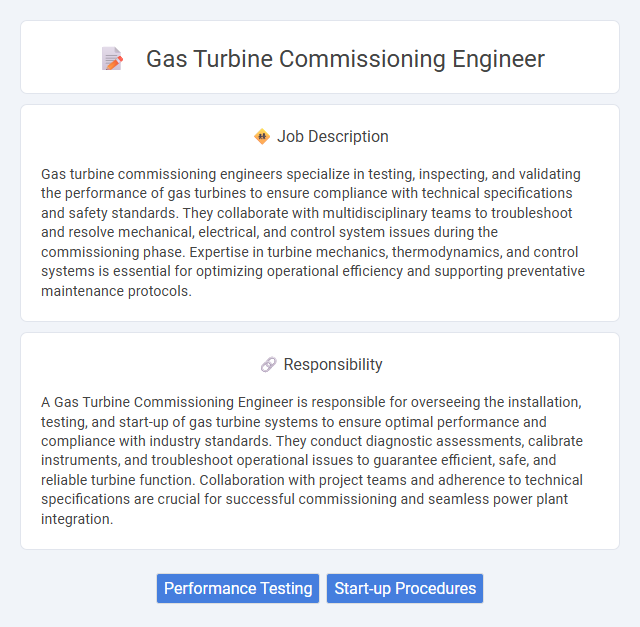
Gas turbine commissioning engineers specialize in testing, inspecting, and validating the performance of gas turbines to ensure compliance with technical specifications and safety standards. They collaborate with multidisciplinary teams to troubleshoot and resolve mechanical, electrical, and control system issues during the commissioning phase. Expertise in turbine mechanics, thermodynamics, and control systems is essential for optimizing operational efficiency and supporting preventative maintenance protocols.
Individuals with strong analytical skills and a background in mechanical or electrical engineering will likely be suitable for a gas turbine commissioning engineer role. Those who can handle high-pressure environments and work collaboratively on-site during testing and troubleshooting may find the job aligns well with their capabilities. Candidates less comfortable with complex technical challenges or irregular working hours might face difficulties adapting to this specialized position.
Qualification
A Gas Turbine Commissioning Engineer requires a bachelor's degree in mechanical, electrical, or aerospace engineering, with specialized training in gas turbine technology. Proficiency in interpreting technical drawings, conducting performance tests, and troubleshooting gas turbine systems is essential. Industry certifications such as API 617 or relevant manufacturer-specific credentials enhance job qualification and credibility.
Responsibility
A Gas Turbine Commissioning Engineer is responsible for overseeing the installation, testing, and start-up of gas turbine systems to ensure optimal performance and compliance with industry standards. They conduct diagnostic assessments, calibrate instruments, and troubleshoot operational issues to guarantee efficient, safe, and reliable turbine function. Collaboration with project teams and adherence to technical specifications are crucial for successful commissioning and seamless power plant integration.
Benefit
Gas turbine commissioning engineers likely experience significant career growth opportunities due to their specialized expertise in turbine systems. They probably enjoy high earning potential given the critical nature of ensuring optimal turbine performance and safety. The role often offers exposure to cutting-edge technology and collaborative environments, enhancing both technical and professional skills.
Challenge
Gas turbine commissioning engineers often face the challenge of diagnosing and resolving complex technical issues under tight project timelines, which requires a high probability of swift problem-solving and decision-making skills. They are likely to encounter difficulties related to system integration and performance verification, demanding precise attention to detail and thorough understanding of turbine mechanics. Success in this role often depends on balancing rigorous safety standards with the pressures of operational deadlines.
Career Advancement
Gas turbine commissioning engineers play a crucial role in the installation, testing, and startup of gas turbine systems, ensuring operational efficiency and safety. Career advancement opportunities include progressing to senior commissioning engineer, project manager, or technical consultant roles within energy and power generation industries. Gaining expertise in advanced diagnostics, software tools, and industry standards accelerates promotion prospects and enhances professional value.
Key Terms
Performance Testing
Gas turbine commissioning engineers specialize in performance testing to ensure turbines operate at peak efficiency and comply with design specifications. They analyze parameters such as exhaust temperature, vibration, fuel consumption, and power output to verify optimal performance and identify potential issues. Precise data collection and interpretation during testing phases enable timely adjustments and guarantee reliability and safety in power generation.
Start-up Procedures
A Gas Turbine Commissioning Engineer specializes in executing detailed start-up procedures to ensure turbines operate safely and efficiently. This role involves calibrating control systems, conducting performance tests, and troubleshooting mechanical or electrical issues during initial energization. Expertise in managing startup sequences minimizes operational risks and guarantees compliance with industry standards.
 kuljobs.com
kuljobs.com